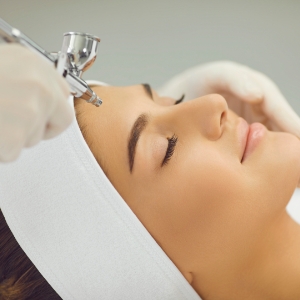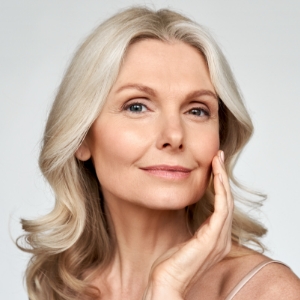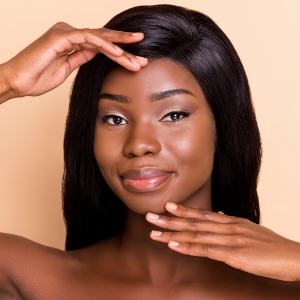Acne Scars

Acne Scars
What are Acne Scars?
Acne scars are reddish or brown marks left on your skin after the breakout of severe acne due to inflammation of the acne blemishes. People who suffer from severe acne often have fluid-filled cysts on their skin. These cysts swell and burst, and their contents leak to other parts of your skin, affecting healthy cells and creating scars. Some cysts are smaller in size, and the scars created after they burst are also minimal. This kind of acne scarring heals quickly. However, the fluid and bacteria from large cysts can also enter the surrounding tissue resulting in deep scarring.
Acne scars are usually in two forms:
- As a result of loss of tissue upon bursting of the cyst, which results in an indentation in the outer surface of your skin
- As a result of your body’s natural healing mechanism that may make too much collagen to heal the wound resulting in a scar raised above the surface of the skin
Around 80% of people between the ages of 11 and 30 suffer from acne, and one out of every five develop scars. Dealing with acne breakouts is difficult enough. You don’t need to suffer the additional frustration that comes from acne scarring. The good news is that no matter how severe the acne, you don’t have to live with your acne scars. Experience smoother and healthier skin by undergoing an acne scar treatment in Dubai today. These treatments provide real and long-lasting results for those suffering from unsightly acne scars.
Acne Scar Treatment Procedures
Depending upon the severity and type of your acne scars, you can choose from a variety of acne scar treatments to even out your skin texture and improve its appearance. In some cases, a combination of treatments will be required to get the desired results.
Some different peeling procedures include the following:
Chemical Peels for Acne Scars
Chemical peels are a type of aesthetic procedure in which different solutions are applied to your skin to allow the upper layers of the dermis to exfoliate and eventually peel off. The peeling action promotes the growth of new skin that is much smoother, clearer, and free of blemishes.
Some chemical peel treatments for acne scars include the following:
- Microderma Chemical Peel: Microderma chemical peel is a double-action treatment for skin rejuvenation. It removes the top layer of dead skin to expose cells to antioxidants for a better result. The procedure exfoliates the skin resulting in a fresher texture and improved skin tone
- TCA Peel: A TCA peel also removes dead skin and promotes the growth of new cells. The procedure promotes enhanced skin tone, better texture, and hydration resulting in skin without pot marks or acne scarring
- Salicylic Peel: Salicylic peels are the most common chemical peel procedure used to reduce acne, freckles, and age spots. A deep exfoliation action removes dead skin and surface oils to allow for new cells to grow
- Dermamelan Peel: The dermamelan peel is a popular go-to acne scar treatment that is also useful for anti-aging. A cocktail of mild, non-invasive acids is applied to the targeted areas of your skin. Dermamelan peel is most commonly done to reduce pigmentation and acne blemishes. As it hinders melanin production, closes, and clears pores, it prevents new breakouts and reduces acne marks
- Kojic Acid Facial Peel: As the most risk-free skin whitening procedure, kojic acid facial peel reduces melanin production and pigmentation. It can also help in the prevention of future blemishes
- Mandelic Peel: A type of AHA peel, mendelic peel has a nice aromatic feel and is relaxing for both the mind and body. The skin is cleansed and toned before the peel is applied to the face. In addition to treating acne scars, the procedure is useful in treating blackheads, blemishes, sun-damaged skin, and wrinkles
Mechanical Treatments for Acne Scars:
- Microdermabrasion: Typically used to treat pockmark-type acne scars, microdermabrasion is a highly effective acne scar treatment procedure that involves the sanding of the outer thicker layer of the skin to promote the growth of new and fresh cells. As a slightly invasive acne scar treatment, microdermabrasion aids in skin rejuvenation and improved skin texture and tone
- Microneedling: As a convenient and highly effective way of treating acne scars, microneedling involves the use of small sterile needles to prick the top-most layer of the skin. This activates your body’s healing mechanism, stimulating the production of collagen and new skin tissue to give you a smoother, healthier, and more even tone
- Fractional Laser Skin Resurfacing: Fractional laser resurfacing is one of the most effective, non-invasive acne scar treatments available today. It rejuvenates the skin by using a laser to remove the outer layer of your skin to encourage the production of collagen and new skin cells
- Dermal Fillers: Dermal fillers are soft gelatinous substances that are injected under the skin to enhance your face volume, smoothen fine lines, and minimize acne scarring. While dermal fillers are a non-invasive and painless acne scar treatment procedure, their results are not long-lasting
Additional Treatment options for Acne Scars:
- Subcision: Subcision is a non-invasive surgical procedure carried out through a special hypodermic needle that is inserted into the top layers of the skin. It reduces marks caused by acne, cellulite, wrinkles, chickenpox, and wounds. The procedure needle causes your skin to rise, stretching scarred tissue and lesions for a more even skin texture
- PRP: A popular aesthetic treatment, PRP can also help combat acne scarring by encouraging the production of collagen and healthy new skin cells in affected tissue. In this procedure, plasma is extracted, cleaned, and injected into the targeted areas to encourage the production of new cells and healthier-looking skin
- PRGF: A PRGF procedure extracts the growth factor from your skin and injects it into the targeted area. It increases cell regeneration while maintaining a natural look
Why is Acne Scar Treatment done?
When acne breakouts grow deep within your skin, they can damage surrounding tissue. Acne is characterized by the formation of large pus-filled cysts that may burst. If they burst, the contents may damage healthy tissue around the breakout site. Your body tries to repair this damage by producing collagen. Collagen is an essential protein in our body that provides structural support to your skin and other parts of your body. When trying to heal the damage caused by the acne, your body may sometimes produce either too much or too little collagen, which leads to the formation of acne scars. If it produces too little collagen, it creates a scar that is an indentation or depression on the surface of the skin. If it produces too much collagen, it creates a scar that is raised on the surface of the skin.
Even when we take all the necessary precautions to avoid getting acne scars, sometimes they are inevitable. This scarring can look unsightly and affect your confidence. Luckily, there are several viable treatment options available that can help diminish these scars and enhance the overall appearance of your skin.
Benefits of Acne Scar Treatment
While some people are comfortable living with acne scars, for others it can be their worst nightmare. Having to deal with the frustration of acne breakouts is hard enough but then having to live with acne scars can be even more challenging. Acne scar treatment procedures can offer you solutions that can greatly improve the look and feel of your skin.
If you’re thinking of getting an acne scar treatment but aren’t sure about it, you should ask yourself the following questions:
- Do I constantly worry about the health of my skin?
- Do I feel like my acne scars limit my social opportunities?
- Have acne scars reduced my self-esteem?
If your answer to any of these questions is “yes”, then an acne scar treatment might be exactly what you need. But worry not, acne scar treatments are safe and effective procedures with very little risk of any side effects.
Who gets Acne Scars?
While acne scars are sometimes inevitable, some people are at a higher risk than others. Your risk of getting acne scars significantly increases if you:
- Have inflammatory acne: This is the kind of severe acne that consists of large fluid-filled cysts and nodules. It penetrates deep within your skin, causing more damage than mild acne
- Squeeze or pop acne: Squeezing, picking, or popping acne can lead to the bursting of fluid-filled cysts and increased inflammation that may cause scars to develop
- Have a family history of acne scarring: Genes also play a critical role in acne scarring
- Smoke: Smoking can significantly increase the risk of developing acne scars
- Delay or do not treat inflammatory acne: The longer you wait to treat your inflammatory acne, the greater the chance of developing acne scars
Risks of Acne Scar Treatments
Like any other skin treatment, acne scar treatment also carries some minor risks and side effects. Post-procedure you may feel some of the following:
- Mild swelling in the treated area
- Slight reddening of the skin
- Mild pain and discomfort in the treated area
- Although rare, there is a chance of an infection and hyperpigmentation
Preparation for Acne Scar Treatment
A little pre-procedure prep can go a long way in helping you get the most out of your acne scar treatment. The following instructions work to your advantage:
- Limit your exposure to the sun and wear plenty of sunblock when going out
- Avoid artificial tanning
- Refrain from using any skincare products that carry hard chemicals like vitamins or boosters
- Do not undergo back-to-back skin treatments
- Avoid smoking a few weeks before the procedure
Aftercare for Acne Scar Treatment
Post-procedure your skin will need extra care to aid in the healing of the treated area.
- Make sure to clean the treated area thoroughly every day
- Choose a correct sunscreen with mild chemicals
- Use icepacks to reduce any swelling or redness
- Avoid picking the area and apply plenty of moisturizers
Acne Scar Treatment Results
The results of your acne scar treatment depend upon the type of acne scarring and the procedure you undertake. While mild scars can disappear in only a week, severe scarring may take weeks or months before you are able to see the desired results. For the best outcome, your dermatologist may also recommend a combination of different treatments. Get in touch with an acne scar treatment specialist at Medcare today to find out what kind of treatment options are available to you.
Acne Scar Treatment in Dubai & Sharjah
No matter how bad your acne scars look, you shouldn’t have to live with your blemishes forever. Acne scars can be an unwanted reminder of a very difficult condition for some people and may reduce a person’s self-esteem. Luckily, acne scars don’t have to be permanent. An acne scar treatment in Dubai or Sharjah can significantly reduce the size and visibility of your acne scars and with time, these blemishes will gradually fade away as if they were never there. At Medcare, we offer a wide range of safe, effective, and affordable acne scar treatments that will help you regain your confidence and restore your beauty.
Acne Scar Treatment Specialists in Dubai & Sharjah
Apart from the type of scarring you have and the procedures you choose, your acne scar treatment results also depend upon the knowledge, experience, and skills of the person performing the procedure. Medcare’s experienced professionals have the necessary expertise and skills required to give you the best chance at healthy glowing skin. At Medcare, your acne scar treatment begins with a consultation with one of our dermatologists who will assess your skin and your medical history to recommend the best options. Our experts will work with you to tailor a treatment plan that works just for you.
Our Specialists



























